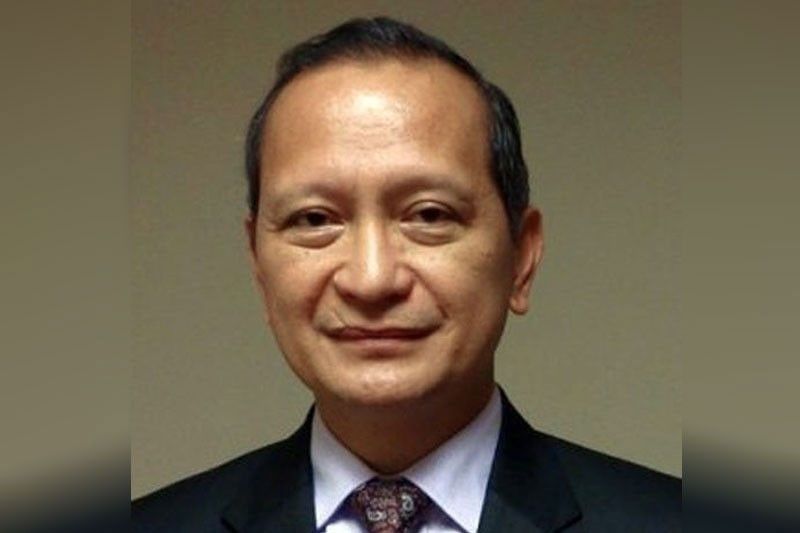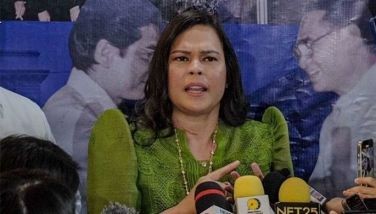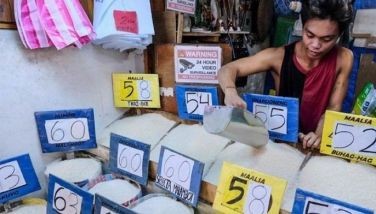Sebastian merely suspended – Palace

MANILA, Philippines — Agriculture undersecretary Leocadio Sebastian – who had signed the unauthorized order on the importation of 300,000 metric tons of sugar for President Marcos – is only under preventive suspension as his resignation has not been acted upon, Malacañang confirmed yesterday.
“He is still under preventive suspension if I am not mistaken, so his status as a government personnel has not been acted upon,” Press Secretary Trixie Cruz-Angeles said at a press briefing yesterday.
Asked why the resignation of Sugar Regulatory Administration (SRA) chief Hermenegildo Serafica was accepted immediately while Sebastian remains under preventive suspension, Angeles replied: “If you look at the resignation of Undersecretary Sebastian, he resigned from his duties as undersecretary of DA (Department of Agriculture).”
“He (Sebastian) did not resign from the civil service or as government personnel, so it’s different,” she added.
At yesterday’s Senate hearing, Sebastian disclosed to lawmakers that Marcos did not accept his resignation, but he was placed under 90-day preventive suspension pending the filing of administrative charges.
Angeles declined to comment on the claim of Crystal Sugar Company, Inc. owner Pablo Lobregat that Malacañang is being fed with wrong information and is being misled into thinking that there is hoarding.
“We are waiting for the result of the investigation so we cannot issue a comment or a response to what is happening while the investigation is ongoing,” the press secretary added.
Wrong information
President Marcos is perhaps being fed wrong or misleading information by competing interest groups, which is preventing him from making timely and needed policy decisions to address the urgent problem of rising prices of sugar owing to a shortage.
This was among the observations made by some senators and industry players at the resumption of the hearing of the Senate Blue Ribbon committee, chaired by Sen. Francis Tolentino, into the attempt to import 300,000 metric tons (MT) of sugar in the middle of harvest season.
Sen. Risa Hontiveros questioned the absence of Executive Secretary Vic Rodriguez at yesterday’s hearing to clarify the apparent conflicting statements from Malacañang and former officials of the DA and SRA on the issuance of the controversial Sugar Order No. 4 (SO4) and its subsequent revocation by Marcos.
“(I) would just like to manifest that what is clear is to me so far is that many things are not clear. And it also seems that many powerful forces are at play,” Hontiveros said, as she cited discrepancies in Rodriguez’s statements on the events leading to and immediately after the issuance of SO4.
She expressed disappointment that Rodriguez declined to answer questions and immediately left the inquiry during the first hearing, even as she questioned the official’s move to lead raids of warehouses storing sugar that turned out to be legitimate imports.
“Who is feeding the President or Malacañang wrong information? Is the Executive Secretary feeding the President wrong information? Is the President caught in the crosshairs of opposing camps? Could this be just an issue between warring camps?” she said.
Rodriguez did not attend the hearing as he was needed at the Cabinet meeting yesterday, Tolentino told the panel.
Rodriguez earlier told the committee that he confronted Sebastian for signing SO4 last Aug. 9 on behalf of the President without express permission from Marcos.
Sebastian and Serafica maintained yesterday they were merely acting on the basis of instructions from Malacañang to prepare recommendation on the importation following meetings on Aug. 1 and 4, both of which Rodriguez was present and Marcos was presiding.
“There were two things that the President wanted to act fast, which he expressed during that meeting, that is one, redirect classification, we have to do it as soon as possible, reclassification from reserved to domestic use of sugar. Second, the need to augment our local supplies through importation,” Sebastian told the committee.
“The sugar shortage, supply shortage is greatly manifested by the rising price of sugar and this was already giving a lot of concern from different sectors, from the private sector, from the industry, even the other departments of government were already expressing their concerns,” he said.
He and Serafica said there were no objections nor reservations raised on the recommendation to import, though they admitted that there were no specific volumes discussed.
Serafica said based on consultations with stakeholders, the figure of 300,000 MT was agreed upon based on surveying data, mostly coming from the SRA.
Senators, however, were skeptical of the extent and quality of the consultations made by the former officials.
Senate Minority Leader Aquilino Pimentel III said despite Sebastian’s claim that he acted in good faith and based on a memo Rodriguez issued last July outlining his duties and responsibilities, he was incredulous that he would sign such an important order without Marcos’ prior and express consent.
Senate Deputy Majority Leader Joseph Victor Ejercito slammed the SRA for failing to respond to the country’s impending sugar crisis as the agency focuses more on importation instead of strengthening the local sugar industry.
Ejercito said the SRA’s supposed efforts to implement the Sugarcane Industry Development Act (SIDA) were not felt by local sugar planters and refiners.
“Have we enjoyed importing that we forgot the intention of SIDA which was really (intended) to mechanize the farming methods and modernize the sugar mills and revitalize the sugar industry?” he said partly in Filipino during the hearing.
“Hopefully, we can really get to the bottom of this and we can achieve food sufficiency by stopping hoarding, smuggling altogether and regulating the importation of these agricultural products and supporting the local agricultural industry,” he said.
‘Perfect storm’
Lobregat, president of the Philippine Sugar Millers Association, warned the shortage would worsen and prices of sugar might go higher with the revocation of S04, which actually should have taken effect as early as June.
He said he was among those consulted who agreed that the country would need 300,000 MT of sugar in the coming months, stressing that the previous Sugar Order No. 3 should have been implemented in March.
He said the court orders, typhoons Agaton and Odette and the May elections, “which caused paralysis in many government agencies,” created the “perfect storm” that led to the situation, which Marcos simply inherited.
“It (SO4) would have given a different perception to market forces…and of course it would depend how fast the sugar comes in – at that point probably it would be cheaper than today,” Lobregat said.
He said imported sugar would definitely be more expensive than a few months ago as Thailand would start milling only in December or January.
Another controversy
Aside from the controversy on sugar importation, lawmakers yesterday looked into the appointment of SRA officials who were not included in the shortlist provided by the Governance Commission for Government-Owned and Controlled Corporations (GCG).
During the organizational hearing of the Senate committee of government corporations and public enterprises chaired by Sen. Alan Peter Cayetano, Sen. Robinhood Padilla raised the seeming violation of the law in the appointment of some officials of the controversy-hit SRA that did not go through the shortlist of the GCG.
“Under RA 10149, the GOCC Governance Act of 2011, Section 15 on the appointment of the board of directors and trustees of GOCCs, indicates that an appointive director shall be appointed by the President from a shortlist prepared by the GCG. Now, the Blue Ribbon committee is probing what happened to the SRA.”
“I want to be clear on this – were the new appointees included in the GCG through the shortlist?” Padilla said as he discussed the provisions of the law on the appointment of officials.
GCG Chairman Alex Quiroz affirmed that the appointees were not included in a shortlist, explaining that he was informed that the officials were appointed in an “acting capacity” and thus “they have to await our supposed shortlist.”
Padilla also pointed out that if the President does not see fit to appoint any of the nominees on the shortlist, “the President shall ask the GCG to submit additional nominees.”
“Clearly it’s not just in the SRA. Also Pagcor, NIA, PCSO,” said Padilla, referring to other GOCCs like the Philippine Amusement and Gaming Corporation, National Irrigation Authority and Philippine Charity Sweepstakes Office. – Paolo Romero, Cecille Suerte Felipe
- Latest
- Trending































